How is Sea Glass Made?
Marooned on an island, he throws a bottle into the ocean...in
time, it winds up broken on a rocky shore, the note lost forever...
It is exciting to think that the glass you have found on the beach may have arrived after an exotic journey floating on the ocean currents.
Imagining such a romantic origin of your sea glass is lots of fun, but it is more likely that your beach gem had a much more commonplace beginning.
Follow along as we look into a more probable source of that rounded and frosted shard of prized sea glass.
On this page:
See Also:
Trash Dumps as the Source of Beautiful Sea Glass
The nicely-tumbled glass with
the frosted but glowing colors that we easily recognize as sea or beach
glass likely came from a much more humble source - the trash dump.
Since glass is the longest lasting item in an old trash dump (doesn't
rust or decompose), most of the sea glass begins its life as old glass
bottles, including those beautiful colored glass bottles, and then it
ends up right where it should be - on the beach, where it takes on a
new life as recycled glass bottles, that is, beach glass (including
lake glass or sea glass).
How is Sea Glass Made - Old Glass Bottles
The origin of sea glass began with what was once bottles, jars,
glassware, dinnerware, et cetera.
It usually ended up in bodies of
water or on the beach as garbage. Large trash dumps long ago produced the best glass beaches. There are a number of other less likely possibilities, for example shipwrecks near the shore.
For home dwellers that lived
close by the sea or lakes in times past, the shore was as good a place as any to get rid
of their refuse.
Years ago, people weren't too concerned
about the environment, so a lot
of junk and garbage was dumped into the oceans and lakes.
We've written a lot more about this main source of sea glass on our page Finding Sea Glass.
Glass does wind up on beaches in other ways discussed below, but all the major "glass beaches" have an old trash dump as their source.
Another way that the "raw material " for beach glass finds its way to the beach is from boats.
Trash, believe it or not, is still regularly dumped into ocean waters
from many large and small seagoing vessels.
Just like in the old stories of someone marooned
on an island who puts a note in a bottle and throws it out in the
current and someone on the other side of the world finds it, corked
bottles will float a long way.
Amazingly, uncorked bottles can float
long distances also. These bottles may find their way to the beach,
where they are busted up when the waves hit the rocks or other objects.
However, sea glass from floating bottles will only form an extremely small percentage of the glass you'll find on a beach.
Glass
floats
are still being used in fishing nets. Nets get old and torn. The glass
floats come loose.
Some of the more unusual colors
you might find may come from these floats.
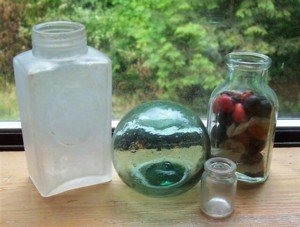
Recycled Glass Bottles
Glass found along shipping lanes can often come from sailors throwing bottles into the sea (no longer done, of course!).
There are also interesting pieces of glass from oriental fishing floats that have broken up on the beach.
How is sea glass made...The
shards from these various sources have been tumbling around in the
water, sometimes for decades, before finding their way onto a given
beach at a given time.
Over time, nature takes what was once man's
garbage and turns it into sparkling natural gems - naturally recycled
glass.
This process is the result of wave action
tumbling the shards among rocks and sand between the tide lines.
Tides, in a
twice a day cycle, cover and uncover that glass, exposing all sides to
sunlight and, with the passage of time, some of the components of the
glass are leached by the water around it, resulting in that frosted
look that identifies genuine tumbled sea glass.
The amount of wave action
directly affects how quickly a shard will become real sea glass. Sea
glass/seaglass shards could take from 5-50 or more years to become that
true object of natural art and beauty that we so love.
Click
here for detailed description of the factors involved.
Learn how to weather surfaces, make driftwood, and cast sand. With everything from wood frames and hanging jars to decorative sailboats and a knotted necklace with shells and pearls, these beautiful items celebrate summer all year long.
Colored Glass Bottles
The results delight
the eyes and emotions of people of all ages, young and not so young.
We
have met people on the beach who've been collecting sea glass for over
30 years.
There's something so alluring about walking on the shore and
finding a piece of sea glass.
For some, collecting sea glass is closely tied up with fond memories of
childhood, family
visits to the beaches, solitary walks alone.
For others, it's trying to figure
out where the sea glass came from - what's the history of that
particular piece of sea glass - how old is it. For them, that's half
the fun of it.
Imagination - The Mystery of How is Sea Glass Made
No matter how you much you can guess at, in most cases you'll never
really know where your piece of beach glass came from - or exactly what
it went
through to become what it is now.
On the other hand, we do know that there are a number of factors that
must be present to turn a glass shard, no matter where it came from,
into a beautifully-rounded and frosted piece of sea glass.
Those factors or conditions that are needed to produce the best sea
glass are explained in this topic Finding
Sea Glass - Meeting the Conditions.
Even with the best conditions, it's kind of like solving a
mystery - how is sea glass made, how'd this particular piece come to be
what it is. Imagining. It's something we never get tired of doing.
What we find today is what keeps us going back tomorrow.
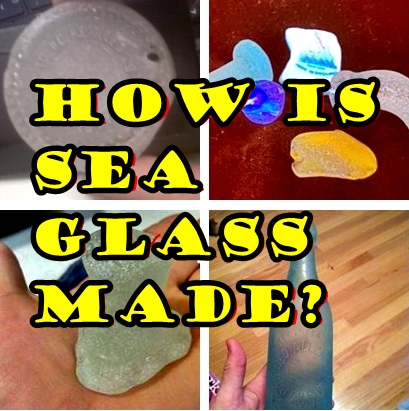



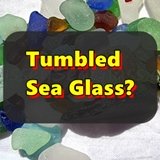
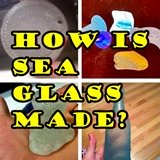
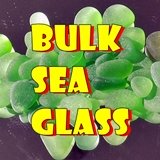
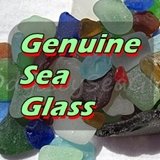
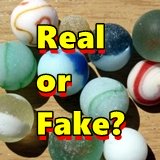
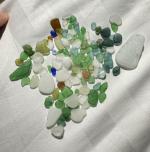

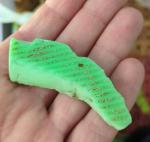
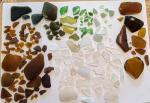
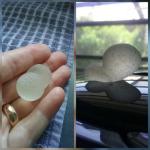


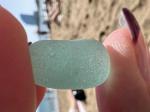
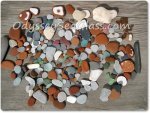
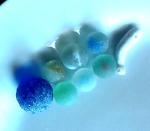
Comments!
We love receiving your comments, but please read the notes below before posting. Thank you!NOTES:
All comments are moderated. If you leave the page you won't see your comment until it is approved.
Select the "Post to Facebook" check box to be notified on FB when a reply has been posted.
If you scan the previous comments you may find an answer to your question. Click the "View X more" link at the bottom (if visible) to see all comments.
Photos - If you would like to include a photo, please use our Photo Forums.
Questions - If you have a question, it may already be answered. Please tap or click here to search of our site first.